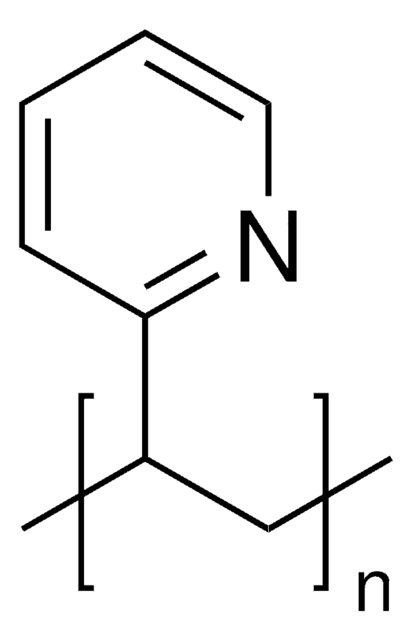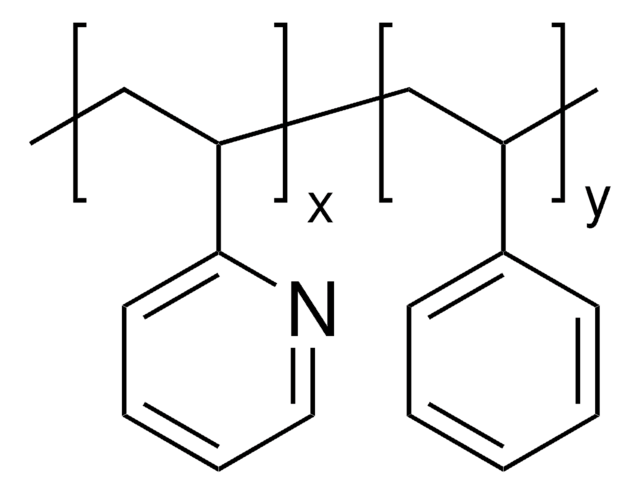472352
Poly(4-vinylpyridine)
average Mw ~160,000
Synonym(s):
4-Vinylpyridine polymer, Poly(p -vinylpyridine)
Sign Into View Organizational & Contract Pricing
All Photos(2)
About This Item
Linear Formula:
(C7H7N)n
CAS Number:
MDL number:
UNSPSC Code:
12162002
PubChem Substance ID:
NACRES:
NA.23
Recommended Products
mol wt
average Mw ~160,000
Quality Level
transition temp
Tg 142 °C (onset, annealed)
solubility
DMF, acetic acid and lower alcohols: soluble
SMILES string
n1ccc(cc1)C=C
InChI
1S/C7H7N/c1-2-7-3-5-8-6-4-7/h2-6H,1H2
InChI key
KFDVPJUYSDEJTH-UHFFFAOYSA-N
Looking for similar products? Visit Product Comparison Guide
Related Categories
Application
Poly(4-vinylpyridine) can be used:
- To prepare metal-containing polymer, applicable as nonlinear optically active material.
- For the removal of perchlorate from an aqueous solution.
Storage Class Code
11 - Combustible Solids
WGK
WGK 3
Flash Point(F)
Not applicable
Flash Point(C)
Not applicable
Personal Protective Equipment
dust mask type N95 (US), Eyeshields, Gloves
Choose from one of the most recent versions:
Already Own This Product?
Find documentation for the products that you have recently purchased in the Document Library.
Customers Also Viewed
Rita Rodrigues et al.
Materials (Basel, Switzerland), 7(12), 8189-8196 (2014-12-22)
We report on the efficiency improvement of organic solar cells (OPVs) based on the low energy gap polyfluorene derivative, APFO-3, and the soluble C60 fullerene PCBM, upon addition of a residual amount of poly (4-vinylpyridine) (PVP). We find that the
Zenghe Liu et al.
Analytical chemistry, 84(7), 3403-3409 (2012-03-20)
Continuous glucose measurement has improved the treatment of type 1 diabetes and is typically provided by externally powered transcutaneous amperometric sensors. Self-powered glucose sensors (SPGSs) could provide an improvement over these conventionally powered devices, especially for fully implanted long-term applications
Lin-feng Zhou et al.
Journal of chromatography. A, 1256, 15-21 (2012-08-14)
A simple and facile needle-adapter was designed for constructing manual on-line polymer monolith microextraction-high performance liquid chromatography (PMME-HPLC). A capillary poly(4-vinylpyridine-co-ethylene glycol dimethacrylate) [poly(VP-co-EGDMA)] monolith was prepared by in situ polymerization, using 4-vinylpyridine (VP) and ethylene glycol dimethacrylate (EGDMA) as
Tobias Miller et al.
Pharmaceutical research, 30(2), 584-595 (2012-11-09)
To gain mechanistic insights into drug loading and lyophilization of polymeric micelles. PEGylated poly-4-(vinylpyridine) micelles were loaded with dexamethasone. Three different methods were applied and compared: O/W emulsion, direct dialysis, cosolvent evaporation. Micellar dispersions with the highest drug load were
Laura Maggini et al.
ChemSusChem, 6(2), 367-373 (2012-12-15)
Herein, we report the first example of a supramolecular carbon nanotube (CNT)-based magnetic depolluting agent for divalent metal ion (M(2+)) removal from aqueous solutions. In particular, magnetic multi-walled carbon nanotubes (m-MWCNTs) coated with poly(vinylpyridine) (PVPy) self-aggregate in aqueous solutions that
Our team of scientists has experience in all areas of research including Life Science, Material Science, Chemical Synthesis, Chromatography, Analytical and many others.
Contact Technical Service





![Zinc bis[bis(trimethylsilyl)amide] 97%](/deepweb/assets/sigmaaldrich/product/structures/294/819/cd22dd81-f7c8-4f0c-944e-1b74c1ad5e6d/640/cd22dd81-f7c8-4f0c-944e-1b74c1ad5e6d.png)

